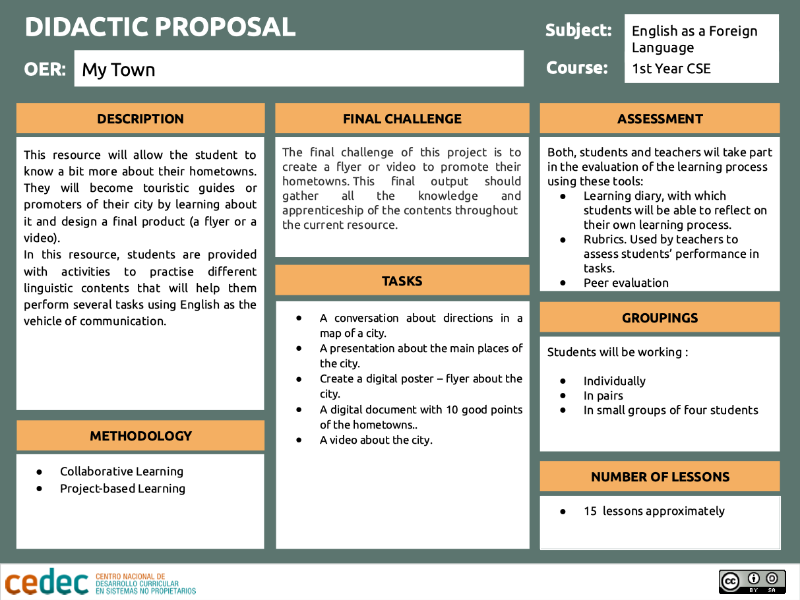Didactic proposal
This open educational resource entitled My Town is based on the curriculum of English as a foreign language and it is aimed at students of the 1st year of compulsory secondary education. However, it can be implemented on other levels,. As a teacher, you can adapt or modify its contents. Likewise, feel free to use the whole resource or just the sections that best fit your teaching demands.
The main topic of this resource will make easy to apply the grammar and vocabulary content to a real situation: describing and promoting their city.
Here, students will learn and practise contents, procedures and attitudes related to the basic knowledge areas of communication, multilingualism and intercultural values.

Download the Didactic Proposal in editable format or in pdf.
By working on this resource, students will face some individual activities, but also some collaborative tasks and a final project in which they will use all their knowledge and will demonstrate how able they are to develop and consolidate some specific and key competences in several learning situations very similar to those in which people may get involved in real life.
This project is part of a set of projects entitled "English in my daily life'"which is based on the curriculum for the 1st year of compulsory secondary education.
The following objectives have been considered in the design of this project:
- to learn while working on a project.
- to encourage collaborative work, since most assignments require information sharing and interaction with other students.
- to foster students' self-learning process by using IT resources.
- to reinforce students' communicative skills through activities of listening and reading comprehension, but above all, through tasks in which they must produce their own oral and written messages.
The project includes several stages that students will need to go through to eventually do the final challenge : create a video to promote tourism into their city. Within this learning scenario, relevant language contents can be practiced and a wide range of tasks is presented so that students are encouraged to practice and improve the linguistic skills required for their final output.
This unit starts with the Breaking the ice section in which students are going to focus their attention into the project and how it will work. By using a Thinking routine students and teachers will identify the previous knowledge. Then students will start working with comparative adjectives and set the beginning of their Learning Diary.
Working with maps. In this section, students will focus their attention on a map and how they will ask for directions when they need to get a certain place into a new city. They will record a video with a dialogue with a situation in which someone is asking about a place on a new city.
What can you find in a city? presents mainly the vocabulary and grammar necessary to talk about the main places you can find in a city so students will be able to explain the main points of a city at the end of this section.
Liverpool on a flyer provides students the opportunity of checking, by reading, how to create a flyer or a digital poster with important information of a city, so they will decide later which information could they write about their own cities.
The My town is the best one section offers the students the moment to start thinking and writing about what makes their towns the best ones. In this section the students will practice the writing skills.
Finally, the Promoting my town section offers the student the final challenge in which students will show how much they have learnt about the topic. They will have to create a video to promote their own towns, their landmarks and why it is important to visit, all of this by using the grammar and the vocabulary they achieved along the whole project.